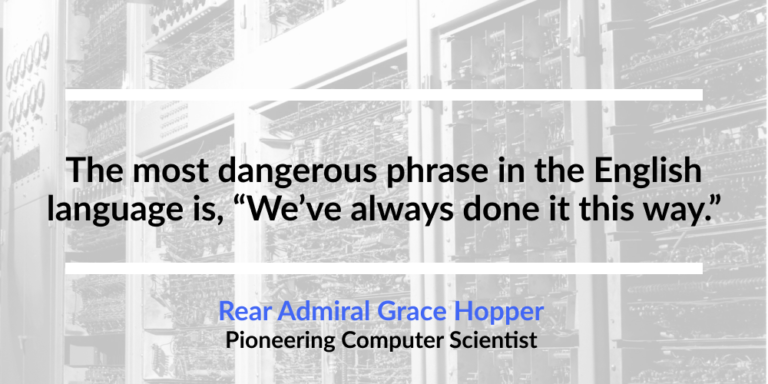The Battle Shaping the Future of CRE
Back in the fall of 2017, I took a trip to New York City to network and learn more about the commercial real estate (CRE) industry’s relationship with technology. After a few days of darting back and forth across Manhattan, I ended up having a beer with a broker — and friend — to recap what had been going on and pick his brain.
“Yea, those guys have won the space,” he stated plainly.
“What do you mean they’ve won?” I asked.
“The market’s picked them as the winner of that category of tech.”
I was beginning to see a common trend among my conversations about proptech: there was no room for customer optionality or evolving business needs. Instead, it seemed like CRE was playing a game that viewed proptech categories with a definitive end and a binary outcome.
Based on my previous experiences within AdTech and digital media — where the general rule of thumb is that your customer process begins only after the client has signed the contract — I knew that the most successful brands measure their campaign performance by the minute. To me, the idea of giving a provider the title of champion without further discretion was unheard of.

After explaining my point of view, he responded with a shrug: “Historically, CRE likes to pick a solution and just go with it. We’ve always done it this way.”
And that’s when it really hit home. Doing something just because that’s the way it’s always been is the perfect sign that an industry is ripe for major innovation. I knew it was only a matter of time.
Fast forward to April 2021. We’ve seen every major tech company develop a “smart building” or “built-world” offering — some are hollow, some have more substance. And now, CRE will be doing things differently than forming a single-file line behind one (sometimes sub-optimal) technology provider. One thing is for certain: post COVID-19, the customer’s needs demand more flexibility than ever before.
Why You Should Care
Moody’s predicts US office vacancy will reach 19.4% in 2021, the highest level since the Savings & Loan Crisis of the early 1990s. This office downturn is different from others like the Dot Com Bust, 9/11 in NYC, and the 2007-2008 Financial Crisis that industry experts are comparing it to. This crisis, unlike those before, was not due to some systemic economic or industry failure. COVID-19 and its consequential lockdowns forced businesses to invest significant capital in digital infrastructure as an alternative to physical space. Because of this, work and offices are no longer in an exclusive relationship and we cannot underestimate the significance of this event.
To be certain, office demand will most certainly rebound, but the difference this time is customer optionality. Since the other crises, it is no secret how far digital and cloud technologies have come. In many other industries ranging from music to film or transportation to banking, digital technology has forever changed the customer experience and distribution solutions in these categories. Despite these advances, people listen to more music, watch more tv and movies, and more people have access to banking and transportation solutions than ever before. But it isn’t Columbia Records, MGM Studios, or NYC’s medallion owners that capitalized on the major shifts. And for commercial real estate, this black swan event is going to produce big winners and big losers. The CRE firms that embrace the fact that customer behavior has dramatically changed — and invest in modernizing their offerings to address these changes — will significantly differentiate themselves. Additionally, tenants that recognize the value of physical and digital space coming together in a way that embraces the desired employee experience will win the war for talent.
The Future of Proptech
There are significant differences In the market, which we view as Proptech 1.0 and Proptech 2.0. Proptech 1.0 was led by a number of the incumbents in some CRE tech categories over the past 10-15 years, and included:
- Closed systems that made integration and data access difficult in order to preserve value for the provider.
- “One-of-everything” feature strategies for monopolization within categories.
- Client relationship management focused on industry leverage by the provider.
- Insider-run teams with little diversity from other industries and backgrounds.
- Generally, commoditization.

Proptech 2.0, the new era which was started by WeWork’s ascent and accelerated by the pandemic and lockdowns, is being led by new companies focused on:
- Open platforms that play nice with others and give CRE firms control over their data in order to create client value and optionality.
- Deep focus on customer optionality by addressing market needs through flexibility and interoperability.
- Client relationship management that is focused on client ROI leading to strengthened relationships.
- Teams bringing new talent sets from other industries and backgrounds together with traditional CRE experience.
- Generally, innovation.
Unless commercial real estate as an industry somehow avoids the fate of every other industry that has undergone digital transformation, it will be the companies that follow the Proptech 2.0 strategy that will take it to new heights. The way businesses and consumers experience physical space will be elevated. Strong platforms looking to build healthy partner ecosystems will provide CRE firms with better optionality and solutions. Category monopolies will cease to exist but TAM will grow in a way that provides proptech adopters far bigger outcomes than before.
Looking Forward
This is why I’m so excited to announce that HqO has raised $60M in Series C financing from leading venture capitalists and CRE firms (you can read more about the financing here).
This round signifies a big step forward for proptech, and we’re thankful for the support from both top-tier tech investors and CRE firms. With this capital, HqO will continue to put client value first and work with the CRE firms that believe in the opportunity for innovation over reverting to commoditization. Despite this milestone, we believe we are still only 1% done in building our vision.
Want to join us?



